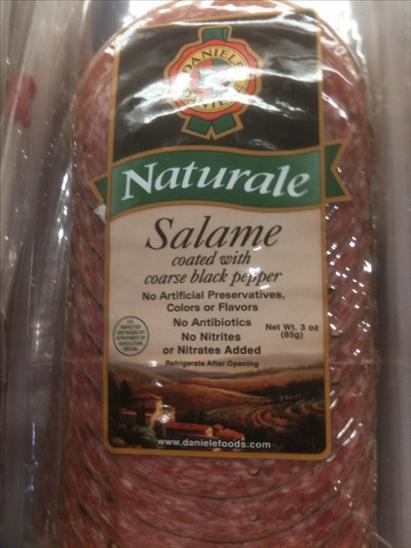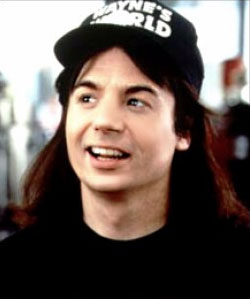Evan Henke, a MS student at the University of Minnesota School of Public Health writes the recent expanded recall of over 1.25 million pounds of salami products produced by Rhode Island-based Daniele Inc. was long overdue.
 Five days after Daniele’s initial recall of all black-pepper coated salami products on January 23/10, tests by the Rhode Island Department of Health found the outbreak strain of Salmonella Montevideo in an open container of black pepper used to coat salami products. On Jan. 29/10, I found a 3oz. package of the shredded product on store shelves in Minneapolis. Daniele had not listed this product on their initial recall list. For some reason, Daniele Inc. had decided that this product was still safe to sell to adults and children even after every other black-pepper coated product was recalled and a test of the company’s black pepper returned positive for Salmonella.
Five days after Daniele’s initial recall of all black-pepper coated salami products on January 23/10, tests by the Rhode Island Department of Health found the outbreak strain of Salmonella Montevideo in an open container of black pepper used to coat salami products. On Jan. 29/10, I found a 3oz. package of the shredded product on store shelves in Minneapolis. Daniele had not listed this product on their initial recall list. For some reason, Daniele Inc. had decided that this product was still safe to sell to adults and children even after every other black-pepper coated product was recalled and a test of the company’s black pepper returned positive for Salmonella.
As a student of food safety, I purchased the product on Jan. 29th and called Daniele headquarters on Feb 2nd to ask why the product was still on the shelves. A spokeswoman assured me the product was not part of the recall, was not a concern of the company, and was safe to eat, all the while completely understanding my confusion.
Like any good citizen, I proceeded to hand the products over to the Minnesota Department of Agriculture the next day for microbial testing. I was told by an enthusiastic employee that the information on the product would be sent to the USDA’s Food Safety and Inspection Service (FSIS) for further investigation.
Two days after contacting Daniele Inc. directly and less than 24 hours after handing the product over to the Minnesota Department of Agriculture and FSIS, Daniele Inc. announced that all 3oz. packages of the product were to be added to the recall on Feb. 4th, 12 days after their they decided the product was safe enough to continue to sell and 7 days after a container of black pepper in the factory where the product was produced tested positive for the outbreak strain of Salmonella.
I would like to give the benefit of the doubt to food producers who initiate voluntary recalls after their products have been associated with outbreaks of food borne disease. Unfortunately, neither Daniele Inc. nor FSIS was interested in a thorough investigation of the completeness of the recall. Daniele Inc. either willingly chose to leave 3oz packages of a product reasonably suspected to be contaminated in commerce or was utterly incapable of completely reviewing their production systems and identifying all products that may cause harm to their consumers I hope it is only anecdotal that these small 3oz. packages not only contained very little salami (and thus a minute amount of black pepper that could have caused disease), but also has an extremely high profit margin.
Maybe this lackluster corporate response is an exception to standard practice. Under existing food safety infrastructure, a complete and honest industry recall to protect public health is the only way of determining exactly which products a careless food producer distributes and those that are not reasonably safe to eat.
 Henke (left, exactly as shown) is an avid fan of foodborne disease epidemiology and food safety, and spends most of his free time angering his friends with his interest in food production and careful scrutiny of food safety practices.
Henke (left, exactly as shown) is an avid fan of foodborne disease epidemiology and food safety, and spends most of his free time angering his friends with his interest in food production and careful scrutiny of food safety practices.
 McDonald’s will recall about 12 million "Shrek" drinking glasses because federal regulators found they contain the toxic metal cadmium, which poses health risks.
McDonald’s will recall about 12 million "Shrek" drinking glasses because federal regulators found they contain the toxic metal cadmium, which poses health risks.

 Five days after Daniele’s initial recall of all black-pepper coated salami products on January 23/10, tests by the Rhode Island Department of Health found the outbreak strain of Salmonella Montevideo in an open container of black pepper used to coat salami products. On Jan. 29/10, I found a 3oz. package of the shredded product on store shelves in Minneapolis. Daniele had not listed this product on their initial recall list. For some reason, Daniele Inc. had decided that this product was still safe to sell to adults and children even after every other black-pepper coated product was recalled and a test of the company’s black pepper returned positive for Salmonella.
Five days after Daniele’s initial recall of all black-pepper coated salami products on January 23/10, tests by the Rhode Island Department of Health found the outbreak strain of Salmonella Montevideo in an open container of black pepper used to coat salami products. On Jan. 29/10, I found a 3oz. package of the shredded product on store shelves in Minneapolis. Daniele had not listed this product on their initial recall list. For some reason, Daniele Inc. had decided that this product was still safe to sell to adults and children even after every other black-pepper coated product was recalled and a test of the company’s black pepper returned positive for Salmonella. Henke (left, exactly as shown) is an avid fan of foodborne disease epidemiology and food safety, and spends most of his free time angering his friends with his interest in food production and careful scrutiny of food safety practices.
Henke (left, exactly as shown) is an avid fan of foodborne disease epidemiology and food safety, and spends most of his free time angering his friends with his interest in food production and careful scrutiny of food safety practices.